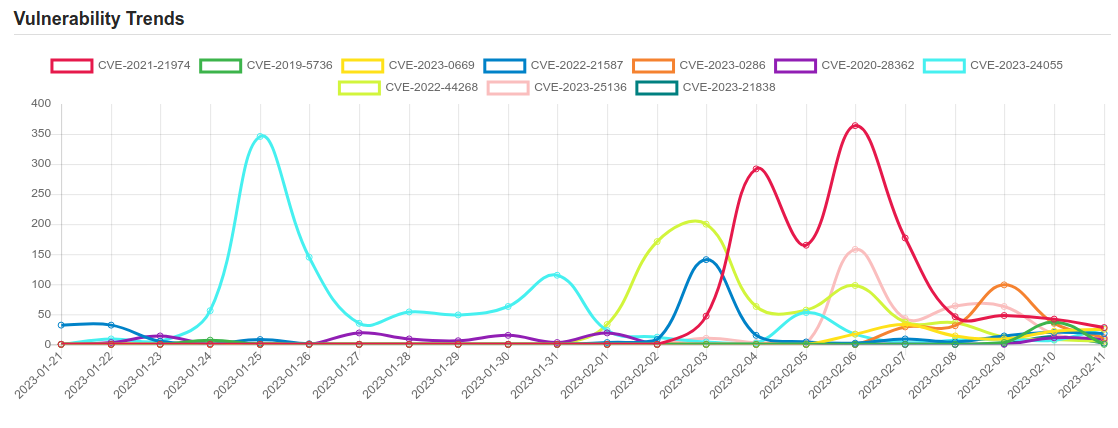Daily Vulnerability Trends: Sun Feb 12 2023

| CVE NAME | CVE Description |
| CVE-2023-25136 | OpenSSH server (sshd) 9.1 introduced a double-free vulnerability during options.kex_algorithms handling. This is fixed in OpenSSH 9.2. The double free can be triggered by an unauthenticated attacker in the default configuration. One third-party report states “remote code execution is theoretically possible.” |
| CVE-2023-21838 | Vulnerability in the Oracle WebLogic Server product of Oracle Fusion Middleware (component: Core). Supported versions that are affected are 12.2.1.3.0, 12.2.1.4.0 and 14.1.1.0.0. Easily exploitable vulnerability allows unauthenticated attacker with network access via T3, IIOP to compromise Oracle WebLogic Server. Successful attacks of this vulnerability can result in unauthorized ability to cause a hang or frequently repeatable crash (complete DOS) of Oracle WebLogic Server. CVSS 3.1 Base Score 7.5 (Availability impacts). CVSS Vector: (CVSS:3.1/AV:N/AC:L/PR:N/UI:N/S:U/C:N/I:N/A:H). |
| CVE-2022-23529 | ** REJECT ** DO NOT USE THIS CANDIDATE NUMBER. ConsultIDs: none. Reason: The issue is not a vulnerability. Notes: none. |
| CVE-2021-3560 | It was found that polkit could be tricked into bypassing the credential checks for D-Bus requests, elevating the privileges of the requestor to the root user. This flaw could be used by an unprivileged local attacker to, for example, create a new local administrator. The highest threat from this vulnerability is to data confidentiality and integrity as well as system availability. |
| CVE-2023-21746 | Windows NTLM Elevation of Privilege Vulnerability. |
| CVE-2020-15174 | In Electron before versions 11.0.0-beta.1, 10.0.1, 9.3.0 or 8.5.1 the `will-navigate` event that apps use to prevent navigations to unexpected destinations as per our security recommendations can be bypassed when a sub-frame performs a top-frame navigation across sites. The issue is patched in versions 11.0.0-beta.1, 10.0.1, 9.3.0 or 8.5.1 As a workaround sandbox all your iframes using the sandbox attribute. This will prevent them creating top-frame navigations and is good practice anyway. |
| CVE-2021-45337 | Privilege escalation vulnerability in the Self-Defense driver of Avast Antivirus prior to 20.8 allows a local user with SYSTEM privileges to gain elevated privileges by “hollowing” process wsc_proxy.exe which could lead to acquire antimalware (AM-PPL) protection. |
| CVE-2021-45335 | Sandbox component in Avast Antivirus prior to 20.4 has an insecure permission which could be abused by local user to control the outcome of scans, and therefore evade detection or delete arbitrary system files. |
| CVE-2021-45336 | Privilege escalation vulnerability in the Sandbox component of Avast Antivirus prior to 20.4 allows a local sandboxed code to gain elevated privileges by using system IPC interfaces which could lead to exit the sandbox and acquire SYSTEM privileges. |
| CVE-2023-25194 | A possible security vulnerability has been identified in Apache Kafka Connect. This requires access to a Kafka Connect worker, and the ability to create/modify connectors on it with an arbitrary Kafka client SASL JAAS config and a SASL-based security protocol, which has been possible on Kafka Connect clusters since Apache Kafka 2.3.0. When configuring the connector via the Kafka Connect REST API, an authenticated operator can set the `sasl.jaas.config` property for any of the connector’s Kafka clients to “com.sun.security.auth.module.JndiLoginModule”, which can be done via the `producer.override.sasl.jaas.config`, `consumer.override.sasl.jaas.config`, or `admin.override.sasl.jaas.config` properties. This will allow the server to connect to the attacker’s LDAP server and deserialize the LDAP response, which the attacker can use to execute java deserialization gadget chains on the Kafka connect server. Attacker can cause unrestricted deserialization of untrusted data (or) RCE vulnerability when there are gadgets in the classpath. Since Apache Kafka 3.0.0, users are allowed to specify these properties in connector configurations for Kafka Connect clusters running with out-of-the-box configurations. Before Apache Kafka 3.0.0, users may not specify these properties unless the Kafka Connect cluster has been reconfigured with a connector client override policy that permits them. Since Apache Kafka 3.4.0, we have added a system property (“-Dorg.apache.kafka.disallowed.login.modules”) to disable the problematic login modules usage in SASL JAAS configuration. Also by default “com.sun.security.auth.module.JndiLoginModule” is disabled in Apache Kafka 3.4.0. We advise the Kafka Connect users to validate connector configurations and only allow trusted JNDI configurations. Also examine connector dependencies for vulnerable versions and either upgrade their connectors, upgrading that specific dependency, or removing the connectors as options for remediation. Finally, in addition to leveraging the “org.apache.kafka.disallowed.login.modules” system property, Kafka Connect users can also implement their own connector client config override policy, which can be used to control which Kafka client properties can be overridden directly in a connector config and which cannot. |
| CVE-2022-0847 | A flaw was found in the way the “flags” member of the new pipe buffer structure was lacking proper initialization in copy_page_to_iter_pipe and push_pipe functions in the Linux kernel and could thus contain stale values. An unprivileged local user could use this flaw to write to pages in the page cache backed by read only files and as such escalate their privileges on the system. |
| CVE-2022-24990 | TerraMaster NAS 4.2.29 and earlier allows remote attackers to discover the administrative password by sending “User-Agent: TNAS” to module/api.php?mobile/webNasIPS and then reading the PWD field in the response. |
| CVE-2021-21974 | OpenSLP as used in ESXi (7.0 before ESXi70U1c-17325551, 6.7 before ESXi670-202102401-SG, 6.5 before ESXi650-202102101-SG) has a heap-overflow vulnerability. A malicious actor residing within the same network segment as ESXi who has access to port 427 may be able to trigger the heap-overflow issue in OpenSLP service resulting in remote code execution. |
| CVE-2019-5736 | runc through 1.0-rc6, as used in Docker before 18.09.2 and other products, allows attackers to overwrite the host runc binary (and consequently obtain host root access) by leveraging the ability to execute a command as root within one of these types of containers: (1) a new container with an attacker-controlled image, or (2) an existing container, to which the attacker previously had write access, that can be attached with docker exec. This occurs because of file-descriptor mishandling, related to /proc/self/exe. |
| CVE-2023-0669 | Fortra (formerly, HelpSystems) GoAnywhere MFT suffers from a pre-authentication command injection vulnerability in the License Response Servlet due to deserializing an arbitrary attacker-controlled object. This issue was patched in version 7.1.2. |
A considerable amount of time and effort goes into maintaining this website, creating backend automation and creating new features and content for you to make actionable intelligence decisions. Everyone that supports the site helps enable new functionality.
If you like the site, please support us on Patreon using the button below

To keep up to date follow us on the below channels.





